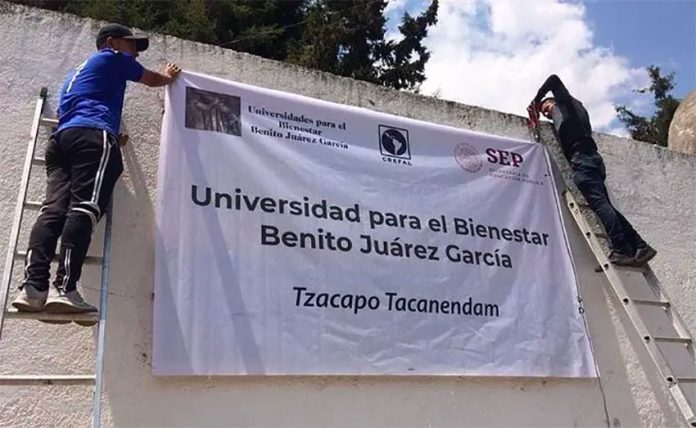A corruption fighters group has slammed the federal government’s new tertiary education scheme in a new report.
Public universities established by the current government are operating outside existing regulations and the quality of the education they offer is questionable, according to Mexicans Against Corruption and Impunity (MCCI).
In its report Universities in Limbo, MCCI said that none of the 30 Benito Juárez Well-Being Universities (UBBJ) it visited in 14 states last October can award degrees to students because they are not certified by the Secretariat of Public Education (SEP) to do so.
The organization also said that all but four of the UBBJ campuses fail to meet the government’s own requirement of being located in towns where the nearest tertiary education institute is at least 50 kilometers away.
“On average, the 30 universities are 22 kilometers from another higher education institute,” the report said.
MCCI claimed that partisan politics played a role in decisions about where the campuses should be located.
Fifty of 100 UBBJ campuses are in municipalities governed by the ruling Morena party, the report said, while a further seven are in municipalities governed by Morena’s coalition partners.
The anti-graft group also said that it detected “atypical” spending on the tertiary education scheme, stating that not a single peso was spent on the program in the first three quarters of last year.
In the fourth quarter, however, the government allocated 880.2 million pesos (US $47.3 million) to the universities, the report said.
MCCI said that assessing the educational programs on offer at 26 of the UBBJ campuses it visited was difficult because their chancellors refused to provide any information.
In such cases, representatives of the organization spoke with principals of high schools in the same municipality, who said that they were unaware of the operation of the universities and questioned the quality of the education they purport to offer.
UBBJ students who spoke with MCCI complained that the campuses they attend are subject to flooding, that classrooms don’t have windows and lack basic educational infrastructure. They indicated that they studied at the government’s new universities because they failed to gain admission to other tertiary education institutes or because they simply wanted to collect the 2,400-peso monthly scholarship on offer.
“As we say in the title [of the report], it’s a program that is in limbo,” said MCCI executive president María Amparo Casar.
“Does it look good? No, it doesn’t look good at all. In terms of its design, in terms of implementation, I don’t believe that it can be a program that meets its objectives.”
In light of its findings, MCCI made five recommendations to the government: increase the number of places available at existing universities rather than create new ones from scratch; build regional campuses of existing public universities; concentrate spending on UBBJ universities in marginalized municipalities; ensure resources are used for their intended purpose; and ensure compliance with SEP requirements so that the new public universities can award degrees.
It’s not the first time that the MCCI has been critical of the federal government.
The organization published a report last year that claimed the government’s youth employment scheme was tainted by corruption.
It was also part of a collective that launched legal action against the Santa Lucía airport with the aim of reviving the previous government’s US $13 billion airport project, which was canceled by President López Obrador after a legally questionable public consultation.
Source: Reforma (sp)
